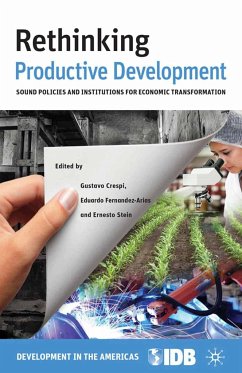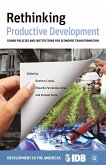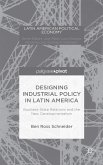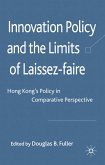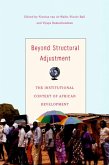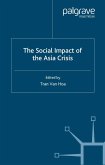Productive transformation requires seizing the opportunities available and opening new ones in a competitive world. Rethinking Productive Development examines the market failures impeding transformation and the government failures that may make the policy remedies worse than the market illness. To address market failures, the authors propose a simple conceptual framework based on the scope and nature of the policy approach. They then systematically analyze country policies through this lens in key areas such as innovation, new firms, financing, human capital, and internationalization to show the power of this way of thinking. Still, the book warns that policymakers cannot be sure what the right policy interventions are and must set up a process to discover them that calls for public-private collaboration. Recognizing that the risk of capture needs to be checked and that even the best policies will fail without the technical, organizational, and political capacity to implement them, thebook concludes with ideas on how to design institutions fostering the right incentives and how to grow public sector capabilities over time.
"A rich set of commissioned case studies grounded in a generous reading of the academic literature, the editors do a beautiful job of presenting the work in a single, reader-friendly voice. ... Rethinking Productive Development is ... well adapted, it could transform the institutions guiding and inhibiting growth in Latin America." (Patrice Franko, Latin American Research Review, Vol. 54 (1), 2019)
"The Washington Consensus its name notwithstanding was invented in Latin America. However, as this useful report shows, inadequate productivity growth since its adoption has forced the region's policymakers to reconsider whether the wholesale rejection of industrial policy was appropriate. The Inter-American Development Bank has long been at the forefront of this rethinking. The authors do a masterful job of not only surveying what is known about 'productive development policies,' but also laying out a policy agenda. Admirable in its analytical exposition, empirical detail, and policy discussion, this is a must-read for development economists and practitioners alike." - Dani Rodrik, Albert O. Hirschman Professor of Economics, Institute for Advanced Study, USA
"Once the commodities boom is over, Latin America will have to discover new sources of economic growth. Tired orthodoxies will not do the trick, but the fresh thinking contained in this volume just might. It explains what went wrong with industrial policies in the 1960s, and what countries have to do differently this time around. First-rate. Should be required reading for policymakers around the region." - Andrés Velasco, Former Finance Minister, Chile
"This book is a must-read for policymakers and practitioners in the elusive world of effective industrial policies. A useful toolbox to think about a topic that is central to any government today." - Mauricio Cárdenas, Minister of Finance and Public Credit, Colombia
"The Washington Consensus its name notwithstanding was invented in Latin America. However, as this useful report shows, inadequate productivity growth since its adoption has forced the region's policymakers to reconsider whether the wholesale rejection of industrial policy was appropriate. The Inter-American Development Bank has long been at the forefront of this rethinking. The authors do a masterful job of not only surveying what is known about 'productive development policies,' but also laying out a policy agenda. Admirable in its analytical exposition, empirical detail, and policy discussion, this is a must-read for development economists and practitioners alike." - Dani Rodrik, Albert O. Hirschman Professor of Economics, Institute for Advanced Study, USA
"Once the commodities boom is over, Latin America will have to discover new sources of economic growth. Tired orthodoxies will not do the trick, but the fresh thinking contained in this volume just might. It explains what went wrong with industrial policies in the 1960s, and what countries have to do differently this time around. First-rate. Should be required reading for policymakers around the region." - Andrés Velasco, Former Finance Minister, Chile
"This book is a must-read for policymakers and practitioners in the elusive world of effective industrial policies. A useful toolbox to think about a topic that is central to any government today." - Mauricio Cárdenas, Minister of Finance and Public Credit, Colombia

